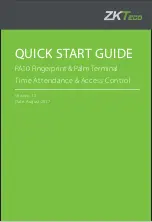
24
Default level
2: System level
Parameters
vd-name
vd-name
: Clears the session statistics of the specified virtual device. The
vd-name
argument
specifies the name of a virtual device. It is a case-insensitive string of 1 to 20 characters, which can be
numerals, letters and underlines.
Description
Use the
reset session statistics
command to clear session statistics.
If no virtual device is specified, the command clears the session statistics on all virtual devices.
Examples
# Clear all session statistics.
<Sysname> reset session statistics
session aging-time
Syntax
session aging-time
{
accelerate
|
fin
|
icmp-closed
|
icmp-open
|
rawip-open
|
rawip-ready
|
syn
|
tcp-est
|
udp-open
|
udp-ready
}
time-value
undo session aging-time
[
accelerate
|
fin
|
icmp-closed
|
icmp-open
|
rawip-open
|
rawip-ready
|
syn
|
tcp-est
|
udp-open
|
udp-ready
]
View
System view
Default level
2: System level
Parameters
accelerate
: Specifies the aging time for the sessions in the accelerate queue.
fin
: Specifies the aging time for the TCP sessions in the FIN_WAIT state.
icmp-closed
: Specifies the aging time for the ICMP sessions in the CLOSED state.
icmp-open
: Specifies the aging time for the ICMP sessions in the OPEN state.
rawip-open
: Specifies the aging time for the sessions in the RAWIP_OPEN state.
rawip-ready
: Specifies the aging time for the sessions in the RAWIP_READY state.
syn
: Specifies the aging time for the TCP sessions in the SYN_SENT or SYN_RCV state.
tcp-est
: Specifies the aging time for the TCP sessions in the ESTABLISHED state.
udp-open
: Specifies the aging time for the UDP sessions in the OPEN state.
udp-ready
: Specifies the aging time for the UDP sessions in the READY state.
time-value
: Aging time, in seconds in the range of 5 to 10000.
Description
Use the
session aging-time
command to set the aging time for sessions of a specified protocol that are
in a specified state.
















































